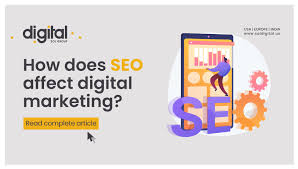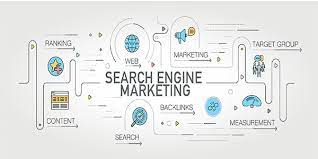SEO and Digital Marketing: A Winning Combination for Online Success
In today’s digital landscape, having a strong online presence is crucial for businesses of all sizes. To stand out from the competition and reach your target audience effectively, it is essential to leverage the power of SEO (Search Engine Optimization) and digital marketing strategies. Let’s explore how these two elements work together to drive success in the online world.
SEO, at its core, focuses on optimizing your website and content to rank higher in search engine results pages (SERPs). When done right, SEO helps increase organic traffic to your website by improving its visibility on search engines like Google. By targeting relevant keywords, optimizing meta tags, creating quality content, and building high-quality backlinks, you can enhance your website’s authority and relevance in the eyes of search engines.
However, SEO alone is not enough to achieve long-term success. This is where digital marketing comes into play. Digital marketing encompasses various techniques such as social media marketing, email marketing, pay-per-click advertising (PPC), content marketing, and more. These strategies aim to promote your brand, engage with your target audience, drive conversions, and ultimately generate revenue.
When combined with SEO efforts, digital marketing amplifies the impact of your optimization efforts. For instance, social media platforms provide an excellent opportunity to share optimized content and engage with potential customers directly. By leveraging targeted ads on platforms like Facebook or Instagram based on user demographics or interests, you can reach a wider audience that may be interested in your products or services.
Another aspect of digital marketing that complements SEO is content creation. Producing high-quality and relevant content not only helps improve organic rankings but also establishes you as an industry expert. Sharing informative blog posts or creating engaging videos can attract more visitors to your site while building trust and credibility among your audience.
Additionally, digital marketing allows you to track and analyze data related to user behavior and campaign performance. By utilizing tools like Google Analytics, you can gain valuable insights into how your website is performing, which keywords are driving the most traffic, and which marketing channels are generating the highest conversions. This data-driven approach enables you to make informed decisions and optimize your strategies for better results.
In conclusion, SEO and digital marketing go hand in hand to create a robust online presence. While SEO focuses on improving organic visibility and ranking, digital marketing strategies help promote your brand, engage with your audience, and drive conversions. By utilizing both approaches effectively, businesses can maximize their online reach, increase website traffic, and ultimately achieve their goals in the digital realm.
5 Frequently Asked Questions About SEO and Digital Marketing
- Why is SEO relevant to digital marketing?
- What is difference between SEO and digital marketing?
- What are the 4 types of SEO?
- What is the difference between SEO and digital marketing?
- Is SEO related to digital marketing?
Why is SEO relevant to digital marketing?
SEO is highly relevant to digital marketing because it plays a crucial role in driving organic traffic and improving the visibility of a website or online content. Here are a few reasons why SEO is an integral part of any digital marketing strategy:
- Increased Organic Visibility: SEO techniques help optimize websites and content to rank higher in search engine results pages (SERPs). When your website appears on the first page of search results for relevant keywords, it increases the chances of attracting organic traffic. Higher visibility means more exposure to potential customers, leading to increased brand awareness and opportunities for conversions.
- Cost-Effective Strategy: Compared to other digital marketing tactics like paid advertising, SEO can be a cost-effective approach in the long run. While it requires time and effort to implement effective SEO strategies, once your website starts ranking well organically, you can generate consistent traffic without ongoing advertising expenses.
- Trust and Credibility: Users tend to trust search engines like Google when they provide them with relevant and reliable results. By optimizing your website using SEO best practices, you enhance its credibility and authority in the eyes of both search engines and users. This trust factor can positively impact user engagement, conversions, and customer loyalty.
- Targeted Traffic: SEO allows you to target specific keywords or phrases that are relevant to your business or industry. By optimizing your website for these targeted keywords, you attract users who are actively searching for products or services related to what you offer. This targeted traffic has a higher likelihood of converting into leads or customers compared to generic traffic from other sources.
- Long-Term Results: Unlike some forms of paid advertising that stop generating traffic once the campaign ends, SEO efforts can have lasting effects on your website’s visibility and organic traffic over time. While algorithms may change periodically, investing in sustainable SEO practices ensures that your website remains optimized for search engines’ evolving requirements.
- Integration with Other Marketing Channels: SEO can seamlessly integrate with other digital marketing channels, such as content marketing, social media marketing, and email marketing. By aligning your SEO strategy with these channels, you can amplify your brand’s online presence and reach a wider audience.
In summary, SEO is relevant to digital marketing because it helps drive organic traffic, improves visibility, builds trust and credibility, targets specific audiences, delivers long-term results, and integrates well with other marketing efforts. By incorporating SEO into your overall digital marketing strategy, you can maximize your online presence and achieve better results in terms of brand exposure, website traffic, customer engagement, and conversions.
What is difference between SEO and digital marketing?
SEO (Search Engine Optimization) and digital marketing are closely related but distinct concepts in the realm of online marketing. While they share some similarities, they have different focuses and objectives.
SEO specifically refers to the practice of optimizing a website and its content to improve its visibility and ranking on search engine results pages (SERPs). The primary goal of SEO is to increase organic (non-paid) traffic to a website by targeting relevant keywords, optimizing on-page elements, building quality backlinks, and enhancing user experience. SEO aims to improve a website’s search engine rankings so that it appears higher in search results when users search for relevant queries.
On the other hand, digital marketing encompasses a broader range of strategies and tactics used to promote products or services online. It includes various channels such as social media marketing, email marketing, content marketing, pay-per-click advertising (PPC), affiliate marketing, and more. Digital marketing aims to engage with the target audience across different platforms, build brand awareness, drive conversions, and generate revenue.
While SEO is primarily concerned with optimizing a website for search engines’ algorithms and improving organic rankings, digital marketing takes a more holistic approach by utilizing multiple online channels to reach and engage with potential customers. Digital marketers leverage various techniques such as social media campaigns, email newsletters, content creation, paid advertisements, influencer collaborations, and data analytics to achieve their goals.
Another distinction lies in the time frame for results. SEO is generally considered a long-term strategy as it takes time for search engines to recognize the optimizations made on a website and reflect them in improved rankings. It requires consistent effort over an extended period. On the other hand, digital marketing campaigns can yield more immediate results depending on the chosen channels and tactics employed.
In summary:
– SEO focuses specifically on optimizing websites for better organic search visibility.
– Digital marketing encompasses a broader range of online marketing strategies.
– SEO aims to improve organic rankings on SERPs.
– Digital marketing aims to engage with the target audience, build brand awareness, and drive conversions across various online channels.
– SEO is a long-term strategy, while digital marketing can deliver more immediate results.
While SEO is an integral part of digital marketing, it is just one component of the broader digital marketing landscape. Both are crucial for businesses looking to establish a strong online presence and achieve success in the digital realm.
What are the 4 types of SEO?
The four types of SEO (Search Engine Optimization) are:
- On-Page SEO: This type of SEO focuses on optimizing the content and elements within your website pages to improve their visibility in search engine results. It includes optimizing meta tags (title tags, meta descriptions), headings, URL structure, keyword usage, image alt tags, and internal linking. On-page SEO ensures that your website is well-structured, relevant, and easily understood by search engine crawlers.
- Off-Page SEO: Off-page SEO refers to activities conducted outside of your website that impact its search engine rankings. It primarily involves building high-quality backlinks from other reputable websites. Backlinks act as “votes” for your site’s credibility and authority in the eyes of search engines. Off-page SEO also includes social media marketing, influencer outreach, guest blogging, and online reputation management.
- Technical SEO: Technical SEO focuses on optimizing the technical aspects of your website to ensure it is easily crawlable and indexable by search engines. This includes improving website speed and performance, implementing proper URL structures, creating XML sitemaps, optimizing robots.txt files, fixing broken links or redirects, implementing structured data markup (schema.org), and ensuring mobile-friendliness and responsive design.
- Local SEO: Local SEO aims to optimize your online presence for location-based searches. It is crucial for businesses targeting a specific geographic area or serving customers locally. Local SEO involves optimizing Google My Business listings, managing online reviews and ratings, ensuring accurate business information (NAP – Name, Address, Phone Number) across directories, targeting location-specific keywords in content creation, and engaging with the local community through events or partnerships.
By utilizing these four types of SEO together effectively, businesses can enhance their visibility in search engine results pages (SERPs), attract targeted organic traffic to their websites or physical locations, and ultimately improve their online presence and conversions.
What is the difference between SEO and digital marketing?
SEO (Search Engine Optimization) and digital marketing are two distinct but interconnected concepts in the realm of online marketing. While they share similarities, it’s important to understand the differences between them.
SEO specifically focuses on optimizing a website and its content to improve its visibility and ranking on search engine results pages (SERPs). It involves various techniques such as keyword research, on-page optimization, link building, and technical optimizations to enhance a website’s authority and relevance in the eyes of search engines. The primary goal of SEO is to increase organic (non-paid) traffic to a website by improving its visibility in search engine listings.
On the other hand, digital marketing is a broader term that encompasses various strategies and channels used to promote products or services online. It includes SEO as one component but goes beyond it. Digital marketing incorporates techniques like social media marketing, email marketing, content marketing, pay-per-click advertising (PPC), influencer marketing, and more. The objective of digital marketing is to create brand awareness, engage with the target audience, drive conversions, and generate revenue.
While SEO is primarily focused on optimizing a website’s structure and content for search engines, digital marketing takes a holistic approach by utilizing multiple online channels for promotion. Digital marketers leverage various platforms like social media networks (Facebook, Instagram), search engines (Google Ads), email platforms (Mailchimp), content publishing platforms (blogs), video-sharing platforms (YouTube), and more.
Another key difference lies in their objectives. SEO aims to improve organic rankings and increase visibility in search engine results. It focuses on attracting organic traffic from users actively searching for relevant information or solutions. In contrast, digital marketing encompasses a wider range of goals such as building brand awareness across different channels, engaging with audiences through social media interactions or email campaigns, driving targeted traffic through paid advertising campaigns, and ultimately converting leads into customers.
In summary, SEO is a subset of digital marketing that specifically focuses on optimizing websites to improve organic search visibility. Digital marketing, on the other hand, encompasses a broader range of strategies and channels to promote products or services online, including SEO. Both SEO and digital marketing are integral components of a comprehensive online marketing strategy, each playing a distinct role in driving online success.
Is SEO related to digital marketing?
Yes, SEO (Search Engine Optimization) is a crucial component of digital marketing. While digital marketing encompasses a wide range of strategies and techniques to promote products or services online, SEO plays a significant role in optimizing websites and content for search engines.
SEO focuses on improving a website’s visibility and ranking on search engine results pages (SERPs) by targeting relevant keywords, optimizing meta tags, creating quality content, and building authoritative backlinks. By implementing effective SEO practices, businesses can increase organic traffic to their websites and attract potential customers who are actively searching for their products or services.
Digital marketing, on the other hand, encompasses various online marketing strategies such as social media marketing, email marketing, pay-per-click advertising (PPC), content marketing, and more. These strategies aim to promote brands, engage with target audiences, drive conversions, and generate revenue.
SEO is an integral part of digital marketing because it helps drive organic traffic to websites and complements other digital marketing efforts. For example, when combined with content marketing strategies like blogging or video creation, optimized content can attract more visitors while establishing brand credibility.
Furthermore, SEO also impacts other aspects of digital marketing. For instance, when running paid advertising campaigns through PPC platforms like Google Ads or Bing Ads, having well-optimized landing pages can improve the Quality Score of ads and lower the cost per click.
In summary, while SEO is just one aspect of digital marketing, it plays a crucial role in improving organic visibility and attracting targeted traffic to websites. By incorporating effective SEO practices into broader digital marketing strategies, businesses can enhance their online presence and achieve better results in terms of brand visibility, customer engagement, and conversions.




